Israel–Poland relations
Israel–Poland relations comprise diplomatic relations between Israel and Poland. Israel has an embassy in Warsaw,[1] while Poland has an embassy in Tel Aviv.[2] The Polish ambassador to Israel is Marek Magierowski, while the newly appointed Israeli ambassador to Poland is Yacov Livne, and the charge d'affaires is Tal Ben-Ari Yaalon. Both countries are members of the Organisation for Economic Co-operation and Development, the Union for the Mediterranean and United Nations.
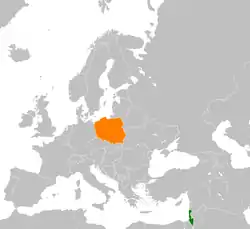 | |
Israel |
Poland |
|---|---|
In 2007, approximately 1,200,000 Israeli citizens were eligible for Polish citizenship,[3][lower-alpha 1] including about 202,300 people who were born in Poland or had a Polish-born father.[4] David Ben-Gurion, Menachem Begin, Shimon Peres and other important figures in Israeli history were born in Poland.
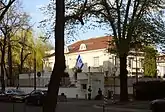
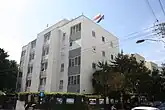
History
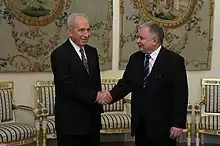
Starting in the late 900s, Poland was home to one of the largest Jewish communities in Europe. In World War II and the Jewish genocide perpetrated by Germany, much of Poland's Jewish community was wiped out and many of those who survived were subjected to anti-Jewish violence and other hostility in Poland. Most of the survivors emigrated to other countries, with about 70,000 emigrating to Israel.[5]
Communist era
From 1947 until the fall of its Communist regime in 1989, Poland was a part of the Soviet Bloc and followed Soviet policy towards Israel. As part of the Bloc, on 29 November 1947 Poland voted in favor of the United Nations Partition Plan for Palestine, which led to the establishment of the state of Israel. On 19 May 1948, Poland also recognized Israel and established diplomatic relations.[6] In September 1948, Israel opened a diplomatic mission in Warsaw.[5] Poland continued to follow Soviet policy towards Israel. After 1951, relations with Israel deteriorated as the Soviet Union significantly increased its involvement in the Arab world.[5] In June 1967, after the Six-Day War, Poland joined the Soviet Bloc in severing diplomatic relations with Israel.[6]
In May 1948, Polish-born David Ben-Gurion became Israel's first prime minister.
In 1986, Poland initiated contacts with Israel, and both countries soon opened interest offices in the other country, and in 1988 an Israel-Poland Chamber of Commerce was formed.[7]
Post Communist era
In 1989, Poland's communist government fell, and in November 1989 Polish-born Israeli Deputy Prime Minister Shimon Peres visited Poland, paving the way for the resumption of diplomatic relations. During his visit, Peres met with Polish President Wojciech Jaruzelski and Prime Minister Tadeusz Mazowiecki.[8] Full diplomatic relations were restored on 27 February 1990, leading to expanded political, military, economic, and cultural cooperation between the two countries.[6] In May 1991, Polish President Lech Wałęsa visited Israel.[9]
Trade and transportation agreements
In 1995, Israel signed an Association Agreement with the European Union (EU) which includes free trade and came into effect in 2000.[10] In 2004, on Poland joining the EU, the free trade provisions of the EU Agreement applied to trade between Israel and Poland. In 2016, trade between Israel and the EU totaled €34.3 billion,[11] while trade between Israel and Poland was US$682 million.[11] Israel's main exports to Poland include: gas turbines, packaged medicaments, calcium phosphate, fruits and vegetables and medical instruments. Poland's main exports to Israel include food-based products, textiles processing machines, vehicle chassis, cars, buses, dairy and wheat.[11]
There are regular flights between Israel and Poland by the following airlines: Arkia, El Al, Enter Air, LOT Polish Airlines, Ryanair, Travel Service and Wizz Air.
State visits
|
|
Bilateral relations
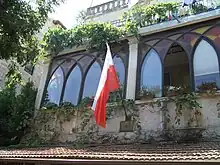
Over the years, both Israel and Poland have signed numerous bilateral agreements including an Agreement on Cooperation in Culture, Science and Education (1991); Agreement for the Avoidance of Double Taxation and the Prevention of Fiscal Evasion with Respect to Taxes on Income (1991); Agreement on Cooperation in Culture, Science and Education (1991); Air Transport Agreement (1991); Agreement for the Promotion and Reciprocal Protection of Investments (1992); Agreement in the field of Economy, Science and Technology regarding Cooperation Applied to Agriculture and Food Industry (1993); Agreement on Technical Cooperation in Dairy Development (1997); Agreement on Cooperation in Tourism (1999); Agreement on the Abolition of Visa Requirement for holders of Ordinary and National Passports (2000); and an Agreement on Cooperation and Mutual Assistance in Customs Matters (2001).[24]
Diplomatic incidents
In early 2018, both chambers of the Polish parliament (the Sejm and Senate) adopted an Amendment to the Act on the Institute of National Remembrance, criminalizing the ascription to Poles collectively of complicity in World War II Jewish-Holocaust-related or other war crimes committed by the Axis powers, and condemning use of the expression, "Polish death camp".[25][26][27] The law sparked a crisis in Polish-Israeli relations.[28] At the Munich Security Conference on 17 February that year, Polish Prime Minister Mateusz Morawiecki said "it is not going to be seen as criminal to say that there were Polish perpetrators, as there were Jewish perpetrators, as there were Russian perpetrators, as there were Ukrainian perpetrators, not only German perpetrators."[29][30] His remark prompted a controversy, and condemnation by prominent Israeli politicians, including Prime Minister Benjamin Netanyahu.[29][31][32] The crisis was resolved in late June that year when the Polish and Israeli prime ministers issued a joint communiqué endorsing research into the Jewish Holocaust and condemning the expression, "Polish concentration camps".[33]
Relations again deteriorated in February 2019 when during a visit to Poland, Netanyahu said, "Poles collaborated with the Nazis". Misquotes of this in the media as "the Poles collaborated with the Nazis" led Morawiecki to consider cancelling his planned visit to Israel the following month for a Visegrád Group summit.[34] Netanyahu's office clarified that this was a misquote by the Jerusalem Post, and he did not say "The Poles" but "a not insignificant number of Poles", an explanation accepted by the Polish government.[35] However, the dispute reignited 3 days later, when Israeli foreign minister Israel Katz claimed that "the Poles imbibe antisemitism from their mothers’ milk" and subsequently refused to apologise, resulting in Poland pulling out of the Visegrad Group summit altogether, leading to its cancellation.[36] U.S. Ambassador to Poland Georgette Mosbacher remarked that there was no room for offensive comments,[37] and asked Israel to apologize.[38] New Right leader and cabinet minister Naftali Bennett noted that his wife's family lived four years in a forest in Poland and were finally murdered by Poles.[39]
In February 2019, Poland cancelled an Israeli official delegation trip to Poland.[40] In May 2019, a man was arrested for spitting at Polish ambassador Marek Magierowski while he was sitting in his car near the embassy. The man apologized and explained that he had been upset by an antisemitic slur by an embassy guard.[41] Following comments by the Polish Prime Minister calling the incident "xenophobic", 29 former Polish ambassadors signed a letter criticizing the Polish government's response.[42]
Property restitution controversy
In June 2021, Poland proposed a law to put a 10-to-30 year statute of limitation on restitution claims, which would therefore nullify cases regarding property seized during World War II, which Israel's Foreign Minister Yair Lapid described as “immoral and a disgrace.” Polish Prime Minister Mateusz Morawiecki said “I can only say that as long as I am the prime minister, Poland will not pay for German crimes: Neither zloty, nor euro, nor dollar.” Lapid also said, “We are fighting for the memory of the Holocaust victims, for the pride of our people, and we won’t allow any parliament to pass laws whose goal is to deny the Holocaust.”[43] The proposed law would nevertheless also prevent people whose property was confiscated by the Polish communist government (1944–1989) from getting their lost property restituted/compensated.[44][45]
Poland’s President Andrzej Duda finally signed the law on 14 August. In response, Israel recalled its envoy from Poland and told the Polish ambassador not to return.[46][47] Nevertheless, Poland returned its envoy to Israel in July 2022 as a sign of rapprochement in bilateral relations.[48]
See also
References
- this number essentially entails the amount of Israelis with least one Polish great-grandparent, as of 2007.
- Embassy of Israel in Warsaw
- Embassy of Poland in Tel Aviv
- "דרכון פולני בזכות הסבתא מוורשה". ynet. 16 March 2007.
- Israel's Central Bureau of Statistics
- "History of Relations". embassies.gov.il. Retrieved 5 September 2021.
- Cooperation between Poland and Israel
- "Israel-Poland Chamber of Commerce". Archived from the original on 2010-07-07. Retrieved 2010-10-05.
- Turek, Bogdan (27 November 1989). "Peres visit could restore Polish-Israeli ties". UPI. Retrieved 17 August 2021.
- Brinkley, Joel (21 May 1991). "Walesa, In Israel, Regrets Poland's Anti-Semitism". The New York Times. Retrieved 17 August 2021.
- Israel - Trade - European Commission
- OEC: Poland
- "Herzog Unveils Memorial Stone in Emotional Visit to Auschwitz". Jewish Telegraphic Agency. 27 May 1992. Retrieved 16 August 2021.
- Perlez, Jane (21 April 1993). "Gore Congratulates Poland on its Democracy". The New York Times. Retrieved 17 August 2021.
- Israeli PM Ariel Sharon Visits Auschwitz Nazi Death Camp
- "President Katsav visits Poland to mark 60th anniversary of the liberation of Auschwitz". mfa.gov.il. 26 January 2005. Retrieved 17 August 2021.
- "Peres in Poland: Israel Ready to Forgo Land to Achieve Real Peace". Haaretz. 17 April 2008. Retrieved 17 August 2021.
- "Netanyahu, in Poland, calls for peace talks 'without delay'". The Times of Israel. 12 June 2013. Retrieved 17 August 2021.
- "President Rivlin begins official visit to Poland". mfa.gov.il. 28 October 2014. Retrieved 17 August 2021.
- Address by Aleksander Kwaśniewski
- Polish President Lech Kaczyński visits Israel
- Official visit of the President of Poland (Komorowski) to Israel
- Levi Julian, Hana (21 November 2016). "Polish PM Involved in Motor Vehicle Accident in Israel". Jewish Press. Retrieved 5 September 2021.
- Cashman, Greer Fay (17 January 2017). "Jerusalem, Warsaw seek enhanced ties as Polish President visits Israel". The Jerusalem Post. Retrieved 5 September 2021.
- Bilateral Agreements between Israel and Poland
- Eglash, Ruth; Selk, Avi (28 January 2018). "Israel and Poland try to tamp down tensions after Poland's 'death camp' law sparks Israeli outrage". The Washington Post. Retrieved 3 September 2021.
- Heller, Jeffrey; Goettig, Marcin (28 January 2018). "Israel and Poland clash over proposed Holocaust law". Reuters. Retrieved 4 September 2021.
- Katz, Brigit (29 January 2018). "The Controversy Around Poland's Proposed Ban on the Term "Polish Death Camps"". The Smithsonian Magazine. Retrieved 4 September 2021.
- "The Latest: Party head: Israel confirms Polish view on Nazis". ABC News. Retrieved 2018-07-07.
- ""Jewish perpetrators" remark reignites Poland Holocaust dispute". CBS News. 19 February 2018.
- "Statements by Mateusz Morawiecki and Sebastian Kurz". www.securityconference.de. Archived from the original on 2018-03-19. Retrieved 2018-03-20.
- Oppenheim, Maya (18 February 2018). "Benjamin Netanyahu attacks Polish PM for saying Jews were among perpetrators of the Holocaust". The Independent. Retrieved 3 September 2021.
- "Polish Embassy in Israel Vandalized After Polish PM's Controversial Remarks". VOA News. 18 February 2018.
- "The Latest: Party Head: Israel Confirms Polish View on Nazis". Retrieved 2018-07-07.
- Benari, Elad (15 February 2019). "Polish PM 'seriously considering' cancelling Israel visit". Arutz Sheva. Retrieved 5 September 2021.
- Ahren, Raphael (15 February 2018). "Poland moves to end spat with Israel over PM comments, blames media manipulation". The Times of Israel. Retrieved 5 September 2021.
- Lazaroff, Tovah (18 February 2019). "Anatomy of a crisis: How Israel-Polish relations collapsed". Jerusalem Post. Retrieved 4 September 2021.
- "Siding with Poland, US slams Israeli FM's 'offensive' anti-Semitism remark". The Times of Israel. 19 February 2019.
- "US envoy calls on FM Katz apologize to Poland for anti-Semitism remark". The Times of Israel. 20 February 2019.
- Sharon, Jeremy (18 February 2019). "Bennett on Poland: We cannot allow anyone, anywhere to rewrite history". The Jerusalem Post. Retrieved 3 September 2021.
- "Poland cancels Israeli officials' trip over Holocaust property restitution row". The Times of Israel. 13 May 2019. Retrieved 5 September 2021.
- Peleg, Bar; Aderet, Ofer; Landau, Noa (15 May 2019). "Polish President Denounces 'Hate Crime' After Israeli Spits on Ambassador". Haaretz. Retrieved 5 September 2021.
- "Polish ex-diplomats say Warsaw officials politicizing Israeli spitting incident". The Times of Israel. 19 May 2019. Retrieved 5 September 2021.
- Spiro, Amy (27 June 2021). "Israel, Poland summon each other's envoys over Holocaust restitution law spat". The Times of Israel. Retrieved 18 August 2021.
- Sharon, Jeremy (7 July 2021). "Polish Senate begins hearings on Holocaust restitution law". The Jerusalem Post. Retrieved 18 August 2021.
- Siegal, Tobias (24 July 2021). "Polish Law preventing restitution of Jewish property passes in senate". The Jerusalem Post. Retrieved 18 August 2021.
- "Polish law on property stolen by Nazis angers Israel". BBC News. Retrieved 18 August 2021.
- Lazaroff, Tovah (15 August 2021). "Israel recalls envoy to protest signing of Poland's anti-restitution law". The Jerusalem Post. Retrieved 18 August 2021.
- "After year-long spat over Holocaust law, Poland says it's returning envoy to Israel". Times of Israel. 4 July 2022. Retrieved 5 July 2022.


